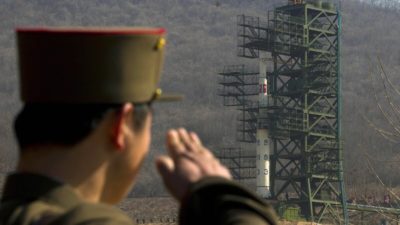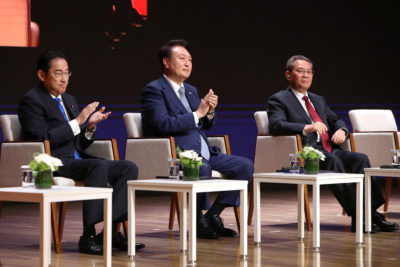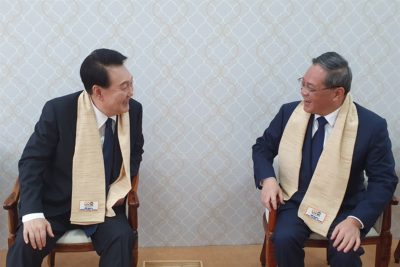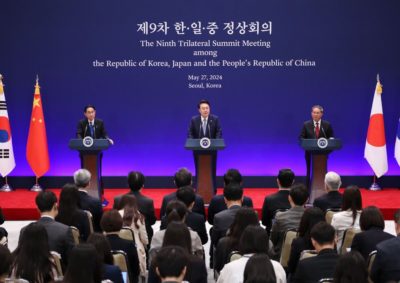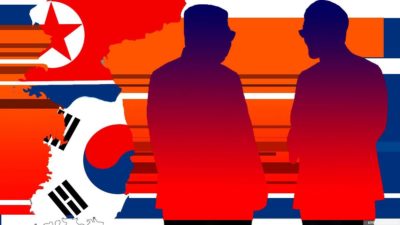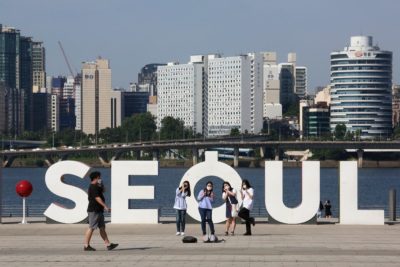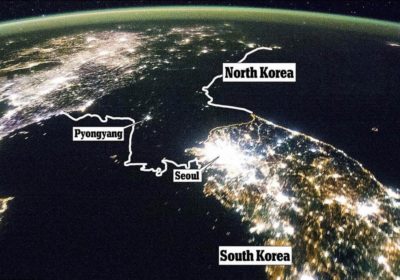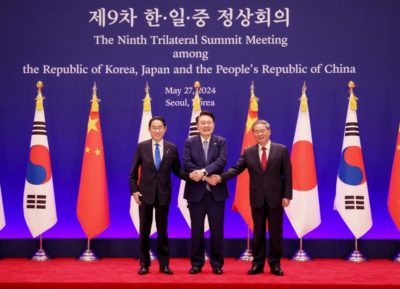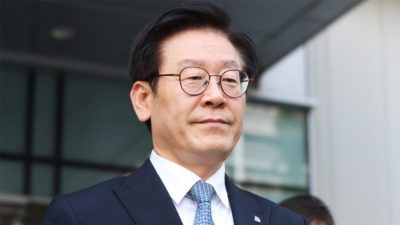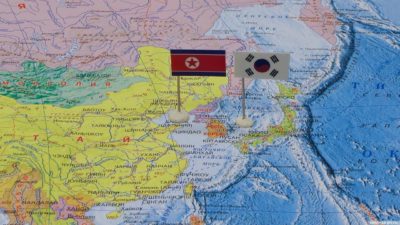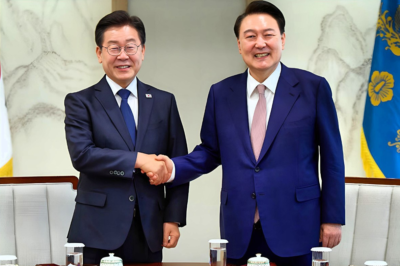The satellite race on the Korean Peninsula: a failed launch by the North
The space race between North and South Korea continues. Since the launch of its first spy satellite, Pyongyang has managed to produce a second one. The first satellite is still in operation, but the launch of the second satellite, using a new type of rocket, was unsuccessful. Nevertheless, the journey has begun, and will continue.
The China-Japan-ROK trilateral summit on May 26-27 in Seoul Part Three: The Summit between the three leaders and its outcome
The participants in the trilateral summit discussed ways to promote cooperation in six specific areas: economy and trade, sustainable development (including the response to climate change), healthcare, science and technology, disaster management and security, and exchange programs…
The China-Japan-ROK trilateral summit on May 26-27 in Seoul. Part two: the bilateral meetings
Li Qiang, Premier of the State Council of the People’s Republic of China, arrived in Seoul around noon. This was his first visit to the country since taking office in March 2023. Lee and Yoon’s first meeting, in September 2023, took place in Indonesia on the margins of the ASEAN summit…
The China-Japan-ROK trilateral summit on May 26-27 in Seoul. Part one: the long road to the meeting
A three-party summit between South Korea, Japan and China was held on May 26-27, 2024. On the first day of the event, South Korea’s President Yoon Seok-yeol held separate bilateral talks with Japanese Prime Minister Fumio Kishida and Premier of the State Council of China Li Qiang, followed by a trilateral meeting, the announcement of a joint statement, and, on the next day, a business forum…
A chronicle of inter-Korean tensions in spring 2024. Part Two: Actions of the DPRK
Pyongyang has successfully conducted a ground-based jet test of a solid-fueled engine for a new type of medium-range hypersonic missile. Tensions on the Korean peninsula will likely continue to rise, and missile launches, drills, and visits by strategic bombers, aircraft carriers, and nuclear subs to Korea will continue.
The PRC-Japan-Republic of Korea Summit was held in Seoul
After a hiatus of more than three years, the PRC-Japan-Republic of Korea trilateral configuration resumed its work in Seoul at the end of May this year. However, its prospects remain unclear due to the extremely complex political environment in the East Asian region. On 26-27 May, the capital of the Republic of Korea, Seoul, hosted a series of summit meetings with the participation of Chinese Prime Ministers Li Qiang and Japanese Prime Minister Fumio Kishida…
A chronicle of inter-Korean tensions in spring 2024. Part One: Actions of the South
The scale of regional tensions has eased somewhat since the end of the joint US-South Korean exercise on March 14, 2024. Both sides made bellicose statements, the South Koreans continued to conduct field training exercises both on their own and with the US, and the North Korean leadership occasionally launched missiles…
Some events that arose immediately after the resumption of the China-Japan-South Korea negotiation platform
After more than a 3-year hiatus, Seoul hosted the China-Japan-South Korea trilateral summit on May 26-27, which became a remarkable event in the overall transformation process taking place in East Asia. This event organically fit into a series of previous and subsequent equally significant developments occurring in this region…
Will Lee Jae-myung serve jail time under the new parliament?
As we have noted many times, in the run-up to the April 10, 2024, parliamentary elections, opposition leader Lee Jae-myung fought not only for the success of the Democratic Party of Korea, which he leads, but also for his personal freedom, as he is a defendant in several well-founded criminal cases. Lee emerged victorious, retaining the situation he occupied under the last parliament…
New American dream: to harm China and Russia by burying the Korean status quo
Several status quo situations continue to prevail around the world, including between China and the United States. The status quo is the accepted political term for unresolved global crises, most of which date back to the Second World War. In essence, it means that there is a more or less tacit agreement between rival powers to keep the crises in question frozen. The Korean peninsula, the Taiwan Strait and Western Sahara are just a few examples of these frozen or latent conflicts…
South Korea- a concession?
In the last article in this series we mentioned that after the parliamentary elections on April 10, 2024, which preserved the existing level of confrontation between president and National Assembly, preparations began for a meeting between President Yoon Suk-yeol and opposition leader Lee Jae-myung. This is significant, as the leaders of the two blocs have not met since Yoon became president…
ROK After Parliamentary Elections
South Korea’s parliamentary elections have resulted in the presidential-parliamentary confrontation remaining alive until the end of Yoon Suk-yeol’s presidency. The Conservatives failed to deprive the Democrats of the majority in the parliament while the Democrats did not manage to increase this majority to 2/3 in order to impeach the president. Nevertheless, the situation is generally perceived as a defeat for the Conservatives, because until the end of his term, President Yoon will have to deal with the parliament existing in the logic of factional struggle…
